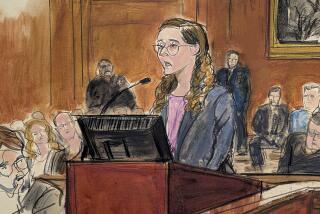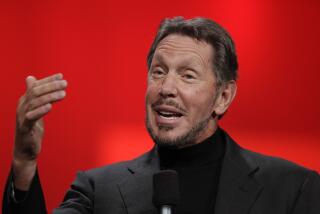Inimical man
- Share via
JUSTLY celebrated as one of the most important literary figures of the 20th century, Ralph Ellison was also a prickly, polarizing man, a definitive new biography shows.
Arnold Rampersad’s exhaustive -- and sometimes exhausting -- book about the author of “Invisible Man” offers an unflinching portrait of Ellison as a brilliant, belligerent artist. The Stanford University professor, whose previous books include biographies of Langston Hughes and Jackie Robinson, was given complete access to Ellison’s papers, and he mines that access to terrific effect.
Ellison’s father gave his newborn son the pretentious name of Ralph Waldo Ellison, in honor of the poet and essayist, at the boy’s birth March 1, 1913, in Oklahoma City. (Ellison would later shave a year off his age.) His father’s death three years later plunged Ralph, his infant brother and his mother into deep poverty. In Jim Crow Oklahoma, young Ralph experienced conflicted feelings about the middle-class African Americans who sometimes snubbed him and an early understanding of the importance of friendships with well-placed white people, Rampersad writes.
Eventually, Ellison hoboed to Alabama to study at the famous Tuskegee Institute. Talented at the trumpet, he wanted to become a classical composer. But he soon found Tuskegee a disappointment -- and financially prohibitive. In letters to his mother, Ellison constantly begged for money; her meager pay as a maid left her with little to offer. In 1936, Ellison quit Tuskegee and headed for New York City. In short order, he met poet and novelist Hughes, who introduced him to the influential writer Richard Wright and to his own future as a man of words.
With guidance from Hughes and later Wright, Ellison painstakingly educated himself as a reader and writer, carefully constructing a career as an astute literary critic. During a long-lasting flirtation with communism in the late 1930s, he became obsessed with writing a novel. Although he began talking about a book in progress as early as 1939, Ellison did not complete “Invisible Man” until 1950, tacking on an epilogue in 1951.
When the novel was published in April 1952, Rampersad reports, the initial responses “were like the first tremors of a major earthquake.” Saul Bellow hailed it as “an immensely moving novel ... marked by greatness.” And Time magazine declared Ellison “an unusual writer by any standard.” In 1953, he won the prestigious National Book Award for fiction.
As Ellison’s stature grew, however, so did his self-absorption. Despite his biographer’s best efforts at empathy, Ellison comes across as difficult to like.
Described by some peers as “egotistical” and “elitist,” Ellison seems to have secretly believed fallacious notions of black intellectual inferiority, even as he repudiated such claims when expressed by whites. Eventually dismissing Hughes as a lightweight, for example, Ellison whined about not having any black intellectual equals -- except Wright and the novelist Albert Murray.
As the years advanced, Ellison became stridently anti-communist; he didn’t include the works of any black writers in a college course he taught on the American novel; and he refused to contribute to Hughes’ efforts to send books to the emerging African nation of Ghana. He never considered attending the 1963 March on Washington. He was also aloof with younger black writers. When the New Republic crowned James Baldwin as the greatest black American writer ever in 1963, Ellison snorted about Baldwin’s homosexuality. When asked to nominate young black writers for university fellowships, he couldn’t think of a single protege, student or friend to recommend. By the 1970s, such fiery young poets as Amiri Baraka and Nikki Giovanni were openly questioning his relevance.
Fondly depicted by a white friend as “every white man’s favorite black man,” Ellison chased after the embrace of white literary high-achievers, counting among his most valued friends Bellow, John Cheever, Robert Penn Warren and R.W.B. Lewis. Still, he was hypersensitive about race, and sometimes stormed off after “slights that white people didn’t see gashed his flesh,” as Rampersad writes.
Among Ellison’s most offensive attributes was his chronic sexism. Early in his career, he pontificated on women: “In many instances, they don’t give a dam[n] [sic] about revolution at all; only to throw off their girdles and let their behinds expand.” Ellison -- who moved into his first wife’s apartment, bringing no money to the union -- proudly reported that she was “not an intellectual by any means” but she “is beautiful, cooks well, and is skillful at all those other things a man is interested in finding in a woman he marries.”
Years later, while living in Rome, he sent his second wife, Fanny -- a sophisticated woman who anchored him during the writing and publication of “Invisible Man” -- on an urgent hunt for ingredients to satisfy his sudden craving for Southern-style pig’s feet. Ellison then laughed about her ordeal: “The poor girl walked her feet off trying to find them because she knew there’d be an evil (SOB) if I didn’t get all the ingredients,” he told a male friend.
During this trying time in Italy, Ellison was working on (as he would for decades) a second novel. Paralyzed by “writer’s block as big as the Ritz,” as he admitted, he never rekindled the genius of “Invisible Man.”
His understandable (and sympathetically rendered) frustration over this failure led to behavior that was self-destructive and, for the long-suffering Fanny, nearly devastating. In Rome, Ellison, then in his 40s, had an affair with a married woman 20 years his junior. He told Fanny about it (in what she called a “sadistic” act) and announced his plan to marry the woman because she could give him what Fanny couldn’t: children. Yet when his lover wavered, Ellison ran back to Fanny -- though not apologetically. Instead, he condescended to the woman who had financially and emotionally supported him for the better part of his career, blaming her for the affair. When Fanny indicated she might not take him back, Ellison wrote that her “butt must be screaming like a child’s for a good spanking.”
Perhaps having internalized such berating, a menopausal Fanny allowed him back into her bed. But she began voicing criticisms that she’d previously swallowed in fear of his “volatile nature and acid tongue.” For solace, she turned to drink. When Ellison was away -- which was often, as he wrestled with the second novel and his demons -- Fanny “dressed in his bathrobe, puffed his cigars, and swilled hard liquor.” It took several years, some spent apart, before Fanny regained her full composure and the marriage began to “right itself,” as Rampersad puts it.
The pages tracing the near-dissolution of the marriage are among this book’s most riveting. Because Ellison published only one novel, Rampersad spends many chapters deconstructing every article, essay and book review the man ever wrote (including minor and unpublished pieces that might have warranted mere footnotes in a more prolific author’s biography). The writing of “Invisible Man” stretches over several chapters, and the biographer devotes another to Ellison’s winning the National Book Award and basking in its considerable glow. In 1964, Ellison did publish an influential book of essays, “Shadow and Act,” but Rampersad treats it in an oddly rushed manner. Instead, he spends the book’s next 300 pages -- arguably about 100 too many -- chronicling the novelist’s lack of productivity, along with all his excuses, in excruciating detail.
All this makes for an intensely researched, elegantly written book that commands readers’ respect, but not our love. For Ralph Ellison -- complex and cantankerous until the end -- it is a fitting coda.
More to Read
Sign up for our Book Club newsletter
Get the latest news, events and more from the Los Angeles Times Book Club, and help us get L.A. reading and talking.
You may occasionally receive promotional content from the Los Angeles Times.










